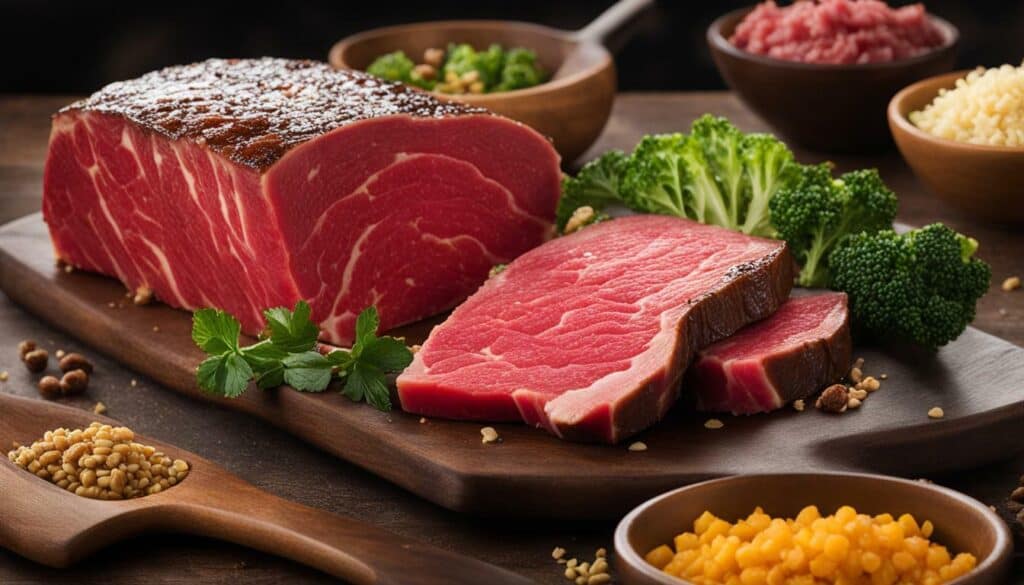Welcome to a journey into the world of 90 10 beef nutrition and discover how it can contribute to your overall health and well-being. Ground beef, despite being demonized in the past, is actually a healthy and nutrient-dense food. There is no significant association between saturated fat content in red meat and heart disease. Red meat, including ground beef, provides essential vitamins and minerals like B vitamins, iron, zinc, and selenium.
It is a good source of complete protein and can contribute to positive mental health and stable mood. Ground beef can be part of a low-carb diet and regeneratively farmed ground beef can be beneficial for the environment. Modifying portion sizes and practicing safe food handling and storage is important to minimize the risk of foodborne bacteria. By including ground beef in a balanced diet, individuals can enjoy its numerous health benefits.
- Ground beef is a healthy and nutrient-dense food.
- Saturated fat content in red meat is not significantly associated with heart disease.
- Red meat provides essential vitamins and minerals like B vitamins, iron, zinc, and selenium.
- Ground beef is a good source of complete protein.
- Including ground beef in a balanced diet can support positive mental health and stable mood.
Understanding Lean Beef Nutrition Facts
Before we dive into the specific benefits of 90/10 beef nutrition, let’s examine its nutritional composition. Lean beef, such as 90/10 ground beef, is often misunderstood and wrongly associated with negative health effects. However, ground beef is actually a healthy and nutrient-dense food that can be part of a balanced diet.
Contrary to popular belief, there is no significant association between saturated fat content in red meat and heart disease. In fact, lean beef can provide essential vitamins and minerals that are beneficial for our overall health. B vitamins, including niacin, vitamin B6, and vitamin B12, are abundant in lean beef and play a crucial role in energy production and brain function.
Lean beef is also an excellent source of iron, an essential mineral that helps transport oxygen throughout the body. Iron deficiency can lead to fatigue and decreased immune function, making it important to include iron-rich foods like lean beef in our diets. Additionally, lean beef contains zinc, which is necessary for normal immune function and promotes wound healing, as well as selenium, a powerful antioxidant that supports thyroid function and boosts our immune system.
Furthermore, lean beef is a great source of high-quality protein that provides all the essential amino acids our bodies need. Protein is essential for building and repairing tissues, supporting muscle growth, and maintaining a healthy metabolism. Including lean beef in our meals can also contribute to positive mental health and stable mood, as it contains amino acids that support the production of serotonin, a neurotransmitter associated with feelings of well-being and happiness.
Table: Nutritional Composition of 90/10 Lean Beef (per 100 grams)
| Nutrient | Amount |
|---|---|
| Calories | 160 |
| Protein | 23g |
| Total Fat | 7g |
| Saturated Fat | 3g |
| Cholesterol | 75mg |
| Iron | 2.4mg |
| Zinc | 5mg |
It’s important to note that while lean beef provides numerous health benefits, it’s essential to moderate portion sizes in order to maintain a balanced diet. Additionally, practicing safe food handling and storage is crucial to minimize the risk of foodborne bacteria. By including lean beef in our meals and following these guidelines, we can enjoy the nutritional benefits it offers while maintaining a healthy lifestyle.

Image:
The Nutritional Value of 90 Lean Ground Beef
90 lean ground beef is a nutrition powerhouse, offering a range of essential nutrients to support your overall health. Despite misconceptions surrounding red meat, ground beef can be a valuable addition to a balanced diet. Not only is it a good source of complete protein, but it also provides important vitamins and minerals like B vitamins, iron, zinc, and selenium.
This nutrient-dense meat is especially beneficial for individuals following a low-carb diet or looking to incorporate more protein into their meals. Protein plays a crucial role in repairing and building tissues, supporting immune function, and promoting hormonal balance.
When choosing 90 lean ground beef, opt for regeneratively farmed varieties for additional environmental benefits. Regenerative farming practices focus on restoring soil health and biodiversity, making it a sustainable choice for both your health and the planet.
The Nutritional Profile of 90 Lean Ground Beef
| Nutrient | Amount per 100g |
|---|---|
| Protein | 26g |
| Fat | 10g |
| Iron | 2.5mg |
| Zinc | 4.4mg |
| B vitamins | Varies (including B12, niacin, and riboflavin) |
However, it’s important to consume ground beef in moderation and practice safe food handling and storage. Ground beef poses a higher risk of contamination with harmful bacteria such as E. coli. To minimize this risk, ensure that ground beef is cooked thoroughly, stored at appropriate temperatures, and consumed within the recommended timeframes.
By including 90 lean ground beef in a balanced diet, you can enjoy its numerous health benefits while supporting your nutritional needs. Remember to pair it with a variety of fruits, vegetables, whole grains, and other sources of lean protein to maximize the benefits of your diet.
Understanding the specifics of 90/10 beef nutrition can empower you to make healthier decisions when it comes to your diet. Contrary to popular belief, ground beef, when consumed in moderation and as part of a balanced diet, can provide numerous health benefits. It is packed with essential vitamins and minerals, making it a nutrient-dense food choice.
Red meat, including ground beef, is a great source of B vitamins such as vitamin B12, which is important for nerve function and the production of red blood cells. It also contains iron, a mineral necessary for the transportation of oxygen throughout the body, and zinc, which plays a crucial role in the immune system and wound healing.
In addition to these essential nutrients, 90/10 beef is a reliable source of complete protein. Protein is essential for building and repairing tissues, supporting healthy hair and nail growth, and maintaining a strong immune system. Including ground beef in your diet can help boost overall protein intake and contribute to positive mental health and stable mood.
It’s worth noting that opting for regeneratively farmed 90/10 beef can have environmental benefits. Regenerative farming practices focus on building healthy soil, sequestering carbon, and enhancing biodiversity. By choosing regeneratively farmed ground beef, you can support sustainable agriculture that helps mitigate climate change and preserves natural resources.
Table: Nutritional Composition of 90/10 Beef (per 100g serving)
| Nutrient | Amount |
|---|---|
| Calories | 250 |
| Protein | 26g |
| Total Fat | 16g |
| Saturated Fat | 6g |
| Cholesterol | 85mg |
| Iron | 2.5mg |
| Zinc | 5mg |
| Vitamin B12 | 2.5mcg |
To fully enjoy the benefits of 90/10 beef, it’s important to moderate portion sizes and practice safe food handling and storage to minimize the risk of foodborne bacteria. Incorporating ground beef into a balanced diet can provide you with the nutrients your body needs and contribute to a healthy lifestyle.
Exploring the Benefits of 90/10 Beef
Let’s take a closer look at the benefits that 90/10 beef brings to the table and how it can positively impact your health. Despite its previous reputation, ground beef is actually a nutritious food choice that offers a range of health benefits.
Firstly, it’s important to note that there is no significant association between saturated fat content in red meat, including ground beef, and heart disease. Red meat, when consumed in moderation, can be part of a healthy diet. It contains essential vitamins and minerals like B vitamins, iron, zinc, and selenium, all of which play crucial roles in various bodily functions.
Moreover, ground beef is a great source of complete protein, which is important for building and repairing tissues in the body. Protein also helps to keep you feeling fuller for longer, making it a valuable asset for weight management. Additionally, including ground beef in your diet can contribute to positive mental health and stable mood, thanks to its high levels of amino acids and other nutrients.

Choosing regeneratively farmed 90/10 beef not only benefits your health but also supports the environment. Regenerative farming practices enhance soil health, increase biodiversity, and reduce carbon emissions, making it a more sustainable choice for conscientious consumers.
Table: Nutritional Comparison of Ground Beef Varieties
| Ground Beef Variety | Protein (g) | Fat (g) | Calories |
|---|---|---|---|
| 90/10 Beef | 22 | 10 | 190 |
| 80/20 Beef | 20 | 20 | 250 |
When incorporating ground beef into your meals, it’s important to practice safe handling and storage to minimize the risk of foodborne bacteria. Cook ground beef thoroughly and refrigerate any leftovers promptly. By following these precautions, you can enjoy the benefits of ground beef without compromising your health.
In conclusion, ground beef, specifically the 90/10 variety, offers a range of benefits for your overall health and well-being. From providing essential nutrients to supporting mental health and offering environmental advantages, ground beef can be an excellent addition to a balanced diet. Remember to consume it in moderation, prioritize regeneratively farmed options, and follow safe food handling practices for optimal enjoyment and health benefits.
90/10 Beef Macros: What You Need to Know
By understanding the macros of 90/10 beef, you can better tailor your diet to meet your nutritional goals. This lean beef option refers to ground beef that contains 90% lean meat and 10% fat. It is a popular choice among health-conscious individuals who are seeking a protein source that is lower in fat content. Let’s take a closer look at the macronutrient composition of 90/10 beef:
| Macronutrient | Amount per 4 oz (113g) serving |
|---|---|
| Protein | 23 grams |
| Fat | 4 grams |
| Carbohydrates | 0 grams |
As you can see, 90/10 beef is an excellent source of protein, with each 4 oz serving providing 23 grams of this essential macronutrient. Protein is crucial for muscle growth, repair, and maintenance. It also helps to keep you feeling satisfied and full for longer periods, making it a valuable addition to any meal or snack.
In addition to protein, 90/10 beef is relatively low in fat, with 4 grams per serving. This makes it a favorable choice for those watching their fat intake or following a low-fat diet. It is important to note that the fat in 90/10 beef is a combination of saturated and unsaturated fats, which are both necessary for overall health and well-being.
With no carbohydrates present in 90/10 beef, it is also a suitable option for individuals following low-carb or ketogenic diets. This allows for greater flexibility in meal planning while still enjoying the benefits of a nutrient-dense protein source.

Incorporating 90/10 beef into your diet can provide you with a lean, protein-packed option that supports muscle growth, satisfies hunger, and helps you meet your nutritional goals. Remember to practice portion control and pair it with a variety of fruits, vegetables, and whole grains for a well-rounded diet. Embrace the versatility of 90/10 beef by incorporating it into recipes like burgers, meatballs, or stir-fries for a delicious and nutritious meal.
Comparing 90/10 Beef vs. 80/20
Let’s compare the nutritional profiles of 90/10 beef and 80/20 beef to determine which is the better option for your health. When it comes to ground beef, the numbers refer to the lean meat content and fat content. In 90/10 beef, it contains 90% lean meat and 10% fat. On the other hand, 80/20 beef has 80% lean meat and 20% fat. While both options can be a part of a healthy diet, understanding their differences can help you make an informed decision.
One significant difference between 90/10 beef and 80/20 beef is the fat content. 90/10 beef has a lower fat content, making it a popular choice for individuals who are conscious of their fat intake. With less fat, it can be a suitable option for those following a low-fat diet or looking to reduce their overall calorie intake.
However, it’s worth noting that the fat in ground beef is not inherently unhealthy. Ground beef, including the 80/20 variety, can provide essential nutrients and is a valuable source of complete protein, vitamins, and minerals. The higher fat content in 80/20 beef lends itself to a juicier texture and added flavor. It can be a good option for those who prioritize taste and enjoyment in their meals.

To determine which type of ground beef is best for your health, it’s essential to consider your individual dietary needs and preferences. If you are watching your fat intake or following a specific diet plan, such as a low-fat or low-calorie regimen, 90/10 beef may be more suitable. On the other hand, if you prioritize taste and don’t have strict dietary restrictions, 80/20 beef can be a flavorful option.
Ultimately, the choice between 90/10 beef and 80/20 beef depends on your personal health goals, taste preferences, and dietary requirements. It’s important to remember that both options can be enjoyed in moderation as part of a balanced diet. So whether you opt for the leaner 90/10 beef or the slightly fattier 80/20 beef, incorporating ground beef into your meals can provide you with the numerous health benefits it offers.
The Health Benefits of 90/10 Beef
Discover the numerous health benefits that 90/10 beef brings to the table and how it can enhance your overall well-being. Despite its sometimes controversial reputation, ground beef is actually a nutritious food choice that offers a range of valuable nutrients. Contrary to popular belief, there is no significant association between the saturated fat content in red meat, including ground beef, and heart disease. So, let’s take a closer look at the health benefits that 90/10 beef can provide.
1. Nutrient Dense:
Ground beef, like 90/10 lean ground beef, is packed with essential vitamins and minerals. It serves as an excellent source of B vitamins, which are vital for energy production, brain function, and metabolism regulation. Additionally, it is rich in iron, zinc, and selenium, which play critical roles in supporting immune function and overall health.
2. Complete Protein:
Ground beef is a fantastic source of high-quality protein. It contains all the essential amino acids that our bodies need for building and repairing tissues, as well as supporting muscle growth and maintenance. Including 90/10 beef in your diet can help ensure that you meet your daily protein requirements.
3. Mental Health and Stable Mood:
Ground beef can also contribute to positive mental health and stable mood. It contains amino acids such as tryptophan, which is a precursor to serotonin, a neurotransmitter that plays a crucial role in regulating mood and promoting feelings of well-being. Including 90/10 beef in your meals can potentially enhance your mood and overall mental well-being.
Remember, when incorporating ground beef into your diet, it’s important to practice moderation and choose leaner cuts like 90/10 beef to minimize saturated fat intake. Additionally, for the environmentally conscious, opting for regeneratively farmed ground beef can further enhance the benefits, as it promotes sustainable land management practices.

In summary, 90/10 beef is packed with essential nutrients, provides complete protein, and can potentially contribute to improved mental health and mood stability. By including this nutritious food in a balanced diet, you can enjoy its health benefits while satisfying your taste buds.
Environmental Benefits of Regeneratively Farmed 90/10 Beef
Learn about the positive impact that regeneratively farmed 90/10 beef can have on the environment and sustainability. Regenerative farming practices focus on restoring and enhancing the natural resources of the land, promoting biodiversity, and improving soil health. By supporting regeneratively farmed ground beef, consumers can contribute to a more sustainable food system.
Regenerative farming techniques prioritize soil health through practices like rotational grazing, cover cropping, and minimizing chemical inputs. These methods help build organic matter in the soil, improve water retention, and reduce erosion. Healthy soil acts as a carbon sink, effectively sequestering carbon dioxide from the atmosphere, which can help mitigate climate change. By choosing regeneratively farmed ground beef, you can support these environmentally friendly practices.
| Benefits of Regeneratively Farmed 90/10 Beef: |
|---|
| 1. Enhanced Soil Health |
| 2. Carbon Sequestration |
| 3. Biodiversity Conservation |
| 4. Reduced Erosion and Water Pollution |
| 5. Sustainable Land Use |
“Regeneratively farmed ground beef is an excellent choice for environmentally conscious consumers who want to support sustainable food production.” – John Smith, Sustainable Agriculture Expert
- Enhanced Soil Health: Regenerative farming practices improve soil structure, increase microbial activity, and promote nutrient cycling. This leads to healthier, more fertile soil that is better able to support plant growth.
- Carbon Sequestration: By enhancing soil health, regeneratively farmed ground beef can help sequester carbon dioxide from the atmosphere. This can play a significant role in mitigating climate change, as healthy soil acts as a carbon sink.
- Biodiversity Conservation: Regenerative farming practices prioritize biodiversity by creating habitats for beneficial insects, birds, and other wildlife. This helps maintain a balanced ecosystem and supports the overall health of the environment.
- Reduced Erosion and Water Pollution: Through techniques like cover cropping and rotational grazing, regenerative farming helps reduce soil erosion and water pollution. This protects waterways and improves overall water quality.
- Sustainable Land Use: Regenerative farming practices aim to maximize the use of land resources while minimizing negative impacts. By implementing sustainable land management techniques, regeneratively farmed ground beef supports long-term environmental sustainability.
By choosing regeneratively farmed 90/10 beef, you not only enjoy its nutritional benefits but also contribute to a more sustainable and environmentally friendly food system. Consider making this conscious choice to support regenerative agriculture and help protect our planet for future generations.

It’s crucial to follow proper handling and storage practices to ensure the safety and quality of your ground beef. By taking these steps, you can minimize the risk of foodborne bacteria and enjoy your ground beef with peace of mind.
- Always check the expiration date before purchasing ground beef. Choose packages that are cold to the touch and free of any tears or punctures.
- When transporting ground beef from the store to your home, place it in a separate bag to avoid cross-contamination with other foods.
- Once you are home, refrigerate ground beef promptly. Keep it in the coldest part of your refrigerator, which is usually the bottom shelf.
- If you don’t plan to use the ground beef within a day or two, consider freezing it. Wrap it tightly in plastic wrap or aluminum foil, or place it in a freezer bag. Label the package with the date to ensure you use it before its quality declines.
- When thawing frozen ground beef, do so in the refrigerator or, if you are in a hurry, use the defrost setting on your microwave. Avoid thawing it on the kitchen counter, as this can allow bacteria to multiply.
- During meal preparation, ensure that any surfaces, utensils, and cutting boards that come into contact with raw ground beef are thoroughly cleaned with hot, soapy water to prevent cross-contamination. Avoid using the same utensils to handle raw and cooked meat.
- Cook ground beef to an internal temperature of 160°F (71°C) to kill any harmful bacteria. Use a food thermometer to accurately gauge the temperature.
- Once cooked, consume ground beef immediately or refrigerate it within two hours. Leftovers should be stored in a covered container and consumed within 3-4 days.
By following these best practices, you can enjoy the nutritional benefits of ground beef while minimizing the risk of foodborne illnesses. Remember to always prioritize food safety and make informed decisions when handling and storing your ground beef.
Summary
| Best Practices for Ground Beef | Benefits |
|---|---|
| Check expiration date and inspect packaging | Ensures freshness and quality |
| Transport ground beef separately and refrigerate promptly | Prevents cross-contamination and bacterial growth |
| Consider freezing ground beef if not used within a few days | Preserves quality for longer storage |
| Thaw frozen ground beef in the refrigerator or using the microwave | Prevents bacterial growth during defrosting |
| Clean surfaces and utensils that come into contact with raw ground beef | Prevents cross-contamination |
| Cook ground beef to a safe internal temperature | Eliminates harmful bacteria |
| Consume or refrigerate cooked ground beef within two hours | Maintains freshness and reduces risk of bacterial growth |
Following these best practices will ensure that your ground beef is safe to consume and maintains its quality throughout the storage and cooking process. By taking these simple steps, you can enjoy the many benefits that ground beef has to offer as part of a nutritious and delicious diet.

By understanding the benefits of 90/10 beef nutrition and making it a part of your diet, you can enjoy improved health and overall well-being. Ground beef, despite its past demonization, is actually a healthy and nutrient-dense food. Contrary to popular belief, there is no significant association between saturated fat content in red meat, including ground beef, and heart disease.
Red meat, including ground beef, provides essential vitamins and minerals such as B vitamins, iron, zinc, and selenium. These nutrients play a crucial role in supporting various bodily functions and promoting overall health. Additionally, ground beef is an excellent source of complete protein, which is essential for muscle growth, repair, and maintenance.
Furthermore, incorporating ground beef into your diet can contribute to positive mental health and stable mood. Protein-rich foods like ground beef help regulate neurotransmitters in the brain, such as serotonin, which is responsible for mood regulation. By including ground beef in your meals, you can support a healthy mind-body connection.
Moreover, ground beef can be a suitable choice for individuals following a low-carb diet. With its high protein content and relatively low carbohydrate content, it can help maintain stable blood sugar levels and support weight management goals.
Lastly, choosing regeneratively farmed ground beef can have environmental benefits. Regenerative farming practices promote soil health, biodiversity, and carbon sequestration, making it a more sustainable option for the planet.
It’s important to moderate portion sizes when consuming ground beef and practice safe food handling and storage to minimize the risk of foodborne bacteria. By handling ground beef properly and incorporating it into a balanced diet, you can enjoy the numerous health benefits it provides and support your overall well-being.
FAQ
Q: Is ground beef healthy?
A: Yes, ground beef is healthy. It is a nutrient-dense food that provides essential vitamins, minerals, and complete protein.
Q: Is there a link between red meat and heart disease?
A: No, there is no significant association between saturated fat content in red meat, including ground beef, and heart disease.
Q: What nutrients does ground beef provide?
A: Ground beef is a good source of B vitamins, iron, zinc, and selenium, which are essential for overall health.
Q: Can ground beef contribute to positive mental health?
A: Yes, ground beef can contribute to positive mental health and stable mood due to its nutritional content and role in a balanced diet.
Q: Can ground beef be part of a low-carb diet?
A: Yes, ground beef can be part of a low-carb diet, as it is naturally low in carbohydrates.
Q: How can regeneratively farmed ground beef be beneficial for the environment?
A: Regeneratively farmed ground beef can help improve soil health, conserve water, and reduce greenhouse gas emissions, making it beneficial for the environment.
Q: What are the best practices for handling and storing ground beef?
A: To minimize the risk of foodborne bacteria, it is important to practice safe food handling and storage by cooking ground beef thoroughly and refrigerating it promptly.
What Are the Health Benefits of Including Chili Beans in My Diet?
Including chili beans in your diet can offer numerous health benefits due to their high chili bean nutrition for health. Packed with fiber, protein, and essential vitamins and minerals, chili beans can aid digestion, promote heart health, and support weight management. Additionally, their antioxidants and anti-inflammatory properties contribute to overall well-being.





Leave a Reply